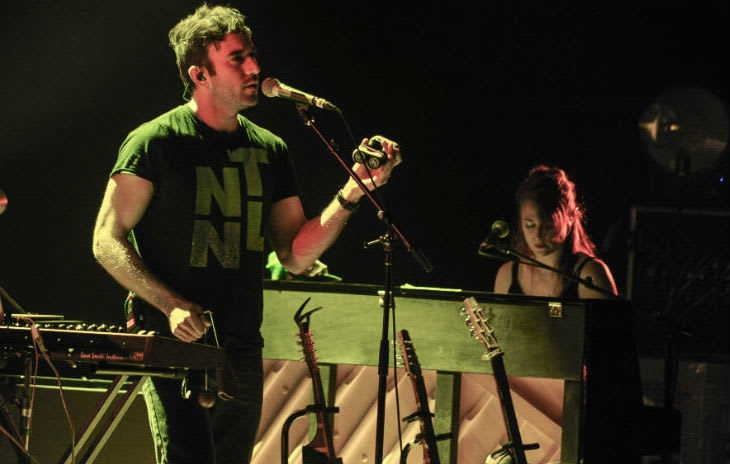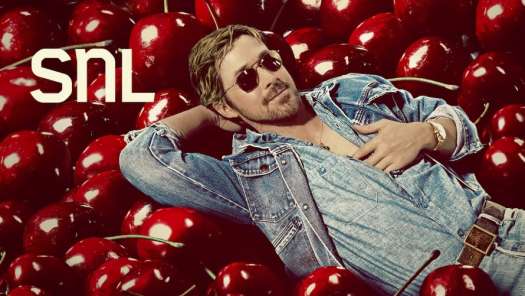It wasn't until halfway through his Massey Hall set that Sufjan Stevens finally addressed the elephant in the room. His new album, Carrie & Lowell, is in large part a tribute to his recently deceased mother, and death's presence, it felt, loomed large over the set's first half.
After a solitary turn at the piano for the instrumental "Redford," Stevens moved centre stage, and his quartet of musicians joined him for a nearly complete performance of the new album, albeit in a rearranged order. "Death With Dignity" was stunning but quiet, and what were presumably home videos from Stevens' childhood played on crystal-shaped background pieces hung behind him. He didn't say a word to the crowd between songs, even after stirring extrapolations of the gentle electronics ending "Should Have Known Better" and a pretty "Drawn to the Blood," both of which were punctuated by big synth parts and bass drum. The songs seemed just a hint rushed, and crowd response was somewhat subdued — how do you cheer for songs about death?
An ambient, electronic take on "All Of Me Wants All Of You" initially felt jarring; my impulse was that it seemed emotionally lacking, but immediately, that felt an unfair judgement — surely, when Stevens is traveling the same painful territory he treads in these songs every night, it's reasonable to expect he might bend them to allow some levity. And indeed, it seemed crucial respite; on slower songs like the aforementioned "Should Have Known Better" and "Eugene," Stevens' voice could be heard cracking softly, especially on lines like, "When I was three, three maybe four, she left us at that video store."
It wasn't all despair: Stevens' band added big, glorious piano to "John My Beloved," turned "The Only Thing" into an epic and added harps to "Fourth of July" to make the line "We're all going to die" sound more bold than defeated; "No Shade in the Shadow of the Cross" and the title track nearly completed Carrie & Lowell; and "The Owl and the Tanager" was a nice addition to the set list. But it all seemed… heavy.
And then suddenly, the weight was lifted.
"Thank you!" were his first words, but Stevens talked for long enough that he eventually lost his train of thought.
"Our parents were obsessed with death, and they talked about it all the time," he told the crowd, describing the way they'd have their past lives revealed to them by psychics, and how they'd come home and tell Stevens and his siblings how, in a past life, they were "something brave and bold and exciting" — Egyptian royalty, citizens of Atlantis, or one of the 12 disciples. It was humorous, and more importantly, it was human. They also believed in reincarnation.
"I've been thinking about death a lot lately," Stevens continued. "It's been rough playing these songs over and over," he explained, but as he plays them more, "I feel less and less depressed by death. Their lives" — those of his mother, and everybody else he's lost — "and stories reside in me."
With this, Stevens launched into visibly and audibly less restrained takes on gentle gems from his back catalogue — "In the Devil's Territory," "Futile Devices" and "Sister" — before blowing the roof off with a long, heavy take on "Blue Bucket of Gold." The song's gigantic, lit-up outro felt like letting go of the pain of Carrie and Lowell; it received a standing ovation.
The set's encore included "To Be Alone With You" and a seemingly thrown-together, charming cover of Neil Young's "There's A World" that was dedicated at least in part to the venue, bookended by Come On, Feel the Illinoise favourites: a gorgeous, piano-only take on "Concerning The UFU Sighting Near Highland, Illinois," stripped to just Stevens and a piano, and a rollicking "Chicago."
The show was a rumination on death and a celebration of life, presented with such sophistication as to make one appreciate both.
After a solitary turn at the piano for the instrumental "Redford," Stevens moved centre stage, and his quartet of musicians joined him for a nearly complete performance of the new album, albeit in a rearranged order. "Death With Dignity" was stunning but quiet, and what were presumably home videos from Stevens' childhood played on crystal-shaped background pieces hung behind him. He didn't say a word to the crowd between songs, even after stirring extrapolations of the gentle electronics ending "Should Have Known Better" and a pretty "Drawn to the Blood," both of which were punctuated by big synth parts and bass drum. The songs seemed just a hint rushed, and crowd response was somewhat subdued — how do you cheer for songs about death?
An ambient, electronic take on "All Of Me Wants All Of You" initially felt jarring; my impulse was that it seemed emotionally lacking, but immediately, that felt an unfair judgement — surely, when Stevens is traveling the same painful territory he treads in these songs every night, it's reasonable to expect he might bend them to allow some levity. And indeed, it seemed crucial respite; on slower songs like the aforementioned "Should Have Known Better" and "Eugene," Stevens' voice could be heard cracking softly, especially on lines like, "When I was three, three maybe four, she left us at that video store."
It wasn't all despair: Stevens' band added big, glorious piano to "John My Beloved," turned "The Only Thing" into an epic and added harps to "Fourth of July" to make the line "We're all going to die" sound more bold than defeated; "No Shade in the Shadow of the Cross" and the title track nearly completed Carrie & Lowell; and "The Owl and the Tanager" was a nice addition to the set list. But it all seemed… heavy.
And then suddenly, the weight was lifted.
"Thank you!" were his first words, but Stevens talked for long enough that he eventually lost his train of thought.
"Our parents were obsessed with death, and they talked about it all the time," he told the crowd, describing the way they'd have their past lives revealed to them by psychics, and how they'd come home and tell Stevens and his siblings how, in a past life, they were "something brave and bold and exciting" — Egyptian royalty, citizens of Atlantis, or one of the 12 disciples. It was humorous, and more importantly, it was human. They also believed in reincarnation.
"I've been thinking about death a lot lately," Stevens continued. "It's been rough playing these songs over and over," he explained, but as he plays them more, "I feel less and less depressed by death. Their lives" — those of his mother, and everybody else he's lost — "and stories reside in me."
With this, Stevens launched into visibly and audibly less restrained takes on gentle gems from his back catalogue — "In the Devil's Territory," "Futile Devices" and "Sister" — before blowing the roof off with a long, heavy take on "Blue Bucket of Gold." The song's gigantic, lit-up outro felt like letting go of the pain of Carrie and Lowell; it received a standing ovation.
The set's encore included "To Be Alone With You" and a seemingly thrown-together, charming cover of Neil Young's "There's A World" that was dedicated at least in part to the venue, bookended by Come On, Feel the Illinoise favourites: a gorgeous, piano-only take on "Concerning The UFU Sighting Near Highland, Illinois," stripped to just Stevens and a piano, and a rollicking "Chicago."
The show was a rumination on death and a celebration of life, presented with such sophistication as to make one appreciate both.




